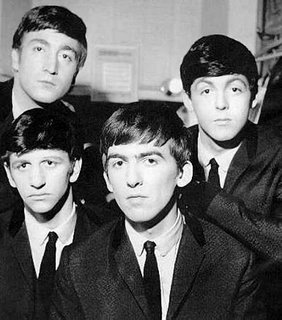Let It Be.

From a review by Terry Teachout of The Beatles: the Biography in Commentary:
"Such an appraisal must begin by taking into account the fact that the Beatles were the first rock-and-roll musicians to be written about as musicians. Elvis Presley, for instance, had attracted vast amounts of attention from the press, but for the most part he was treated as a mass-culture phenomenon rather than as an artist, and so were the other rock musicians of the 50’s and early 60’s (and the swing-era band-leaders and vocalists who came before them). Not so the Beatles. Almost from the time they began making records in 1962, their music was taken seriously—and praised enthusiastically—by such noted classical composers as Leonard Bernstein, Aaron Copland, and Ned Rorem and such distinguished critics and commentators as William Mann, Hans Keller, and Wilfrid Mellers.What was it that made these four musically untutored pop stars stand out in such high relief from their contemporaries? And has their music proved to be of lasting interest, as their admirers of four decades ago predicted it would?...It is, I suspect, no accident that after 1970, none of the four Beatles would write any songs or make any recordings comparable in quality to the ones they made as a group. Together, their musical limitations had been offset by the creative synergy of their collaboration (as well as by the discreet guidance of George Martin, their
producer-mentor). When they began to work independently, the limitations overwhelmed them, and they spent the rest of their lives struggling in vain to rival the achievements of their youth.The historical significance of these achievements, however, cannot be overstated. After the Beatles, rock-and-roll would never be the same. What started out as a stripped-down, popularized blending of country music and rhythm-and-blues intended for consumption by middle-class teenagers evolved into a new musical dialect in which it was possible to make statements complex and thoughtful enough to seize and hold the attention of adult listeners.This is not to say that rock in general has always repaid such close attention. Unlike jazz, which developed with great speed from a purely functional accompaniment of social dancing into a full-fledged art music of the highest possible seriousness, most rock has remained as commercial as the simplest-minded pop music of the pre-rock era. But between the late 60’s, when rock became the lingua franca of the baby boomers, and the late 90’s, when the disintegration of the common culture brought its stylistic hegemony to an end, the best rock groups had much to offer the serious music lover."

0 Comments:
Post a Comment
<< Home